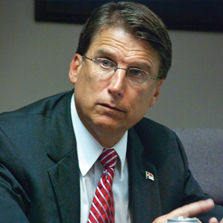
In March, the North Carolina General Assembly held a special
session where it passed legislation that blocked Charlotte from allowing all
people in public buildings to use bathrooms that align with their gender
identities. The bill instead required people to use bathrooms that correspond
to the genders on their birth certificates.
In the eight months since, according to a November Forbes
article, the state has lost $630.4 million. McCrory, lost his job, too,
becoming the first North Carolina incumbent governor to lose a re-election bid.
That's widely attributed to backlash over the bathroom bill. The Forbes
figure calculates the cost of canceled concerts like Bruce Springsteen's;
canceled meetings like the American College Personnel Association's; canceled
sporting events like the NBA all star game and NCAA tournaments; and canceled
business plans like PayPal's intention to build a global operations center in
Charlotte and research firm CoStar's search for a new home. The figure doesn't
count, though, the ongoing business travel companies like PayPal and CoStar
would have sparked. Nor does it count New York City, San Francisco, Atlanta and
Washington, D.C.'s bans on government-sponsored travel to North Carolina, or
future companies or meetings that will look elsewhere.
Those lost opportunities will indeed add up. According to an
MPI/U.S. Travel Association survey conducted in May, 41 percent of meetings
professionals were deterred from U.S. destinations that prohibit universal
bathroom use. The MPI/USTA report also suggested that inclusive locales are
likely to win out. It cited the American Counseling Association, which moved
its 2017 annual conference from Nashville after Tennessee passed a bill in
April that allows therapists and counselors to deny services to LGBTQ people.
The ACA looked in 14 states for a new location and landed on San Francisco.
According to the report, ACA CEO Richard Yep said, "What took precedence
was finding a welcoming city."